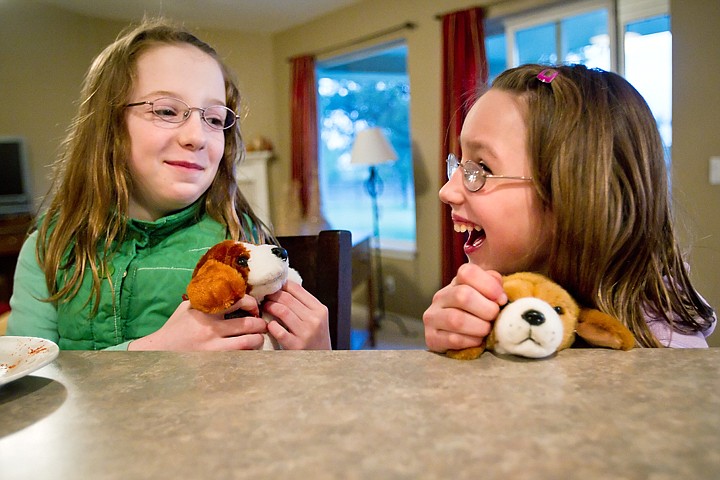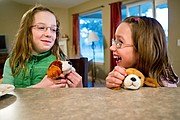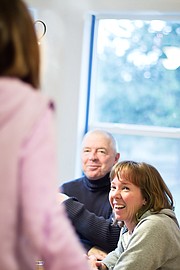Adoption made easy
The Stowells sat down to dinner on Tuesday with routine ease. Quiet conversation, spurts of giggles from the girls. Polite requests to be excused and play with the puppies. Acting as a family has happened naturally all along, Cheryl said, despite the fact that the youngest member couldn't speak English for the better part of the last two years.
The Stowells sat down to dinner on Tuesday with routine ease.
Quiet conversation, spurts of giggles from the girls. Polite requests to be excused and play with the puppies.
Acting as a family has happened naturally all along, Cheryl said, despite the fact that the youngest member couldn't speak English for the better part of the last two years.
"I just can't even say how easy it's been," the Rathdrum mother said as she watched the family's newest member, Katya, 10, adopted from Russia two years ago. "We don't remember life before her."
It can be that way for others, Cheryl insisted.
The more the Stowells reflect on the Russian freeze on U.S. adoptions because of one woman who didn't like how hers turned out, the more they're convinced of everything she did wrong.
Pointing to how they used the same adoption agency - World Association for Children and Parents - as the Tennessee woman who sent her adopted boy back on a plane to Russia, the Stowells can give a litany of pointers on how to better prepare for international adoption.
"What irks me is what I'm seeing on the news (about negative adoption experiences) and what I'm hearing about is really not accurate," said Rory, Cheryl's husband. "Our experience has been completely the opposite."
When the Stowells settled on adopting from Russia 11 years ago, shortly after their daughter Erika was born, they knew there were risks.
Like adopting an older child - they wanted to help a less popular age group - who tend to carry emotional problems if they've been filtered through strenuous situations.
On top of that there can be unknowns with Russian children, said Sabra Larkin with Spence-Chapin international adoption agency in New York.
"They have many economic pressures there. Sometimes orphanages don't know what the children's prior history was, or might not know what the circumstances were," Larkin said. "If they get a baby, they might not know if the mother took drugs or alcohol or not. That's why (potential parents) have to do research and be with a good agency that gives them preparation."
The Stowells said they did both.
As required, they attended parenting training classes through the agency online. They learned about requesting a child who hasn't been in the orphanage system since birth, as previous bonding experiences raise the likelihood of a youth bonding with new adopted parents.
And after receiving a reference from the agency on an adoptable girl, they submitted the child's medical background to an adoption medical service.
"You send the photo and information to the doctor, and he kind of reads between the lines, sees if there are signs of fetal alcohol syndrome," Cheryl said.
She acknowledged there was no way they could know everything - not nearly as much as the information about themselves they compiled for a year, confirmed in background checks and criminal record checks.
"Ultimately, it's a leap of faith," she said. "Once we made the decision to go forward, we had a lot of peace about it. There was no fear we were getting into something we shouldn't."
Once they received the history and photo of a dark-haired girl in pigtails, the next step was a stark decision - flying to meet her, or dropping the adoption.
"We knew once we got there, we could ask all the questions we wanted," Cheryl said.
Russia is more stringent than other countries in requiring two in-person visits before international adoption. During the first visit in January 2008, the Stowells were surprised by what they found at the orphanage in Novosibirsk, the third-largest city in Russia.
The building was run down, Cheryl observed, with a lack of toys.
But still, there was kindness, Rory said.
"They were very loving toward the children," he remembered. "They took care of them, clothed them and fed them with the resources they had."
Bringing games and books, the Stowells tried to work past the language barrier with Katya as she showed them her grades to prove she was smart.
"She'd speak Russian, and we'd all look at the translator," Cheryl said with a laugh, adding that the translator was provided. "There was a lot of pointing going on."
But as the couple took the little girl skating, shopping and out to eat, they already knew she was the right fit, Cheryl said.
"It's just a gut reaction," she said. "She was so adorable when we met her, and we saw who she really was. There wasn't any hiding."
All of Katya's background information was provided in full, Rory added, and all paperwork translated.
"It's very formal. It's a very serious situation," he said. "They just want to get a good family for the kids."
Confident, the couple returned several weeks later for a second visit, when they also had to appear in court to make a case for the adoption.
"They grilled us," Cheryl said, adding that questions spanned the ins and outs of parenting.
Once the ruling was made and a visa issued by the U.S. Embassy in Moscow, Katya was theirs, and a U.S. citizen.
Toting Katya's sparse belongings, which included her favorite sweatshirt from the orphanage and her bear Misha - Russian for teddy bear - they took Katya home.
Adjusting was simpler than expected.
The couple had taken a crash course in teaching themselves Russian, Cheryl said, and they relied on a Russian friend to help out when they got stuck.
After asking to go to school full-time even though she spoke no English, Katya picked up the language rapidly.
"She transitioned fully in English about six months ago," Cheryl said. "Strictly through immersion."
Now she rarely speaks Russian, Rory added.
"Once in awhile I catch her singing (in Russian)," he said with a smile.
She likes to bike, swim and play with dolls, he added. During the summer she and Erika camp out in the backyard.
"She's just a regular girl. They like to do regular stuff for their age group," he said.
A little shy, Katya likes her new home, she said.
"It's cool," she said.
She doesn't remember the orphanage too well, she said. It was all right, she added, except one of the other kids acted bossy all the time.
The kids at her school here are nice, she said.
Cheryl, a Realtor, estimated the whole adoption process took about 18 months.
The cost was roughly $40,000, she said, most stemming from the price of visiting Russia.
"Her," Cheryl said of what made it worthwhile. "She's awesome."
Rory said he was glad to do something that benefited the lives of everyone involved.
"When you see a child from the other side of the world and see the light in her eyes and see she's happy ... You're giving this individual a chance to have a great life," he said. "It's been really good for us, and it's still getting better as we go. It's one of the greatest things you can do."





